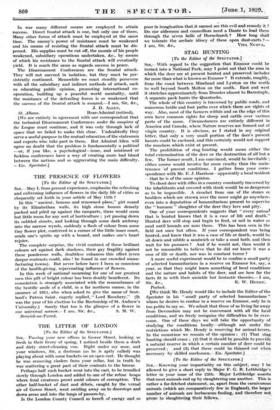THE PRESENCE OF FLOWERS [To the Editor of the SPECTATOR.]
Sni,—May I, from present experience, emphasize the refreshing and enlivening influence of flowers in the daily life of cities so eloquently set forth in your article of May 1 lth ?
In this "ancient, famous and renowned place," girt round by its• Elizabethan walls, its high stone houses densely packed and piled up against the ramparts, there would seem but little room for any sort of horticulture ; yet passing down its cobbled streets, and looking through some dark archway into the narrow wynds, suddenly a flash of colour from some tiny flower plot, contrived in a corner of the little inner court, sends one's spirits up with a bound, and makes one's heart rejoice.
The complete surprise, the vivid contrast of these brilliant colours set against dark shadows, their gay fragility against these ponderous walls, doubtless enhances this effect (even deeper contrasts could, alas ! be found in our crowded manu- facturing towns). But never before have I been so conscious of the health-giving, rejuvenating influence of flowers.
In this week of national mourning for one of our greatest men this gift of bright colour has been doubly beneficent. Its consolation is strangely associated with the remembrance of the beatific smile of a child, in a far northern manse, in the stunmer of 1011, who when asked to give the name of Scot- land's Patron Saint, eagerly replied, Lord Rosebery." (It was the year of his election to the Rectorship of St. Andrew's University.) Surely that too is the glimpse of a flower in
our universal sorrow.—! am, Sir, &c., S. M. W. Bcrurick-on-Ticeed.










































 Previous page
Previous page